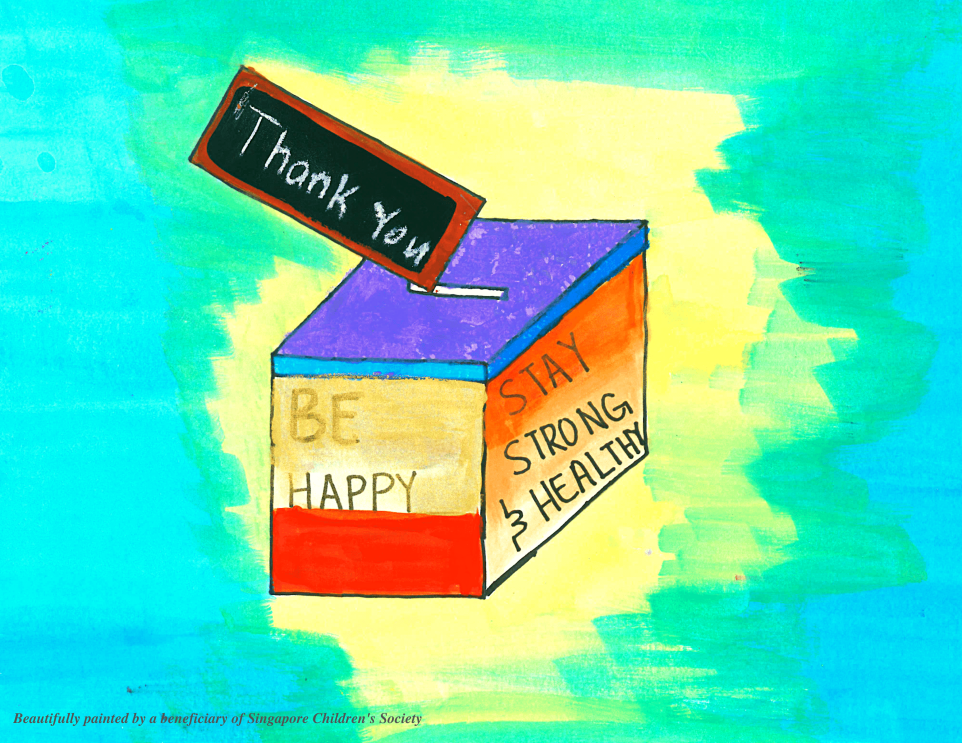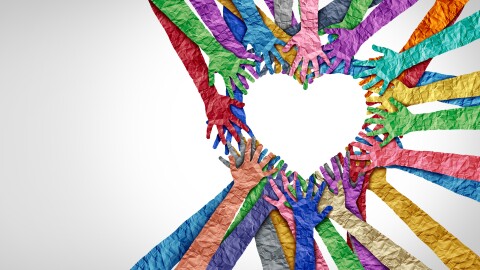The Singapore Children’s Society (SCS) is a Singapore-based non-profit organisation that works closely with individuals and businesses to achieve its vision of bringing relief and happiness to Singapore’s children in need.
We speak to Ms Joyce Teng (Senior Director, Community Engagement and Partnerships), and Mr Chee Thow Wei Liat (Deputy Director, VOX @ Children’s Society) to find out more about SCS and to understand what motivates their people to give and serve children, and how businesses like Amazon Singapore can help play their part.
Thank you for speaking to us Joyce and Wei Liat. To start, could you share more with us about SCS’s mission and key activities?
Joyce: Our mission is to bring relief and happiness to children in need, regardless of their race or religion. Children’s Society has a wide range of programmes, outreach activities, family services and research studies to meet the needs of our beneficiaries. In 2021, our work impacted the lives of 19,973 children, youth, and families.
Wei Liat: At the Society’s 11 centres, we’re on the ground executing these diverse programmes. I personally work at VOX @ Children’s Society, which promotes youth development through interest groups and activities.

We’re constantly finding approaches to engage with today’s youth. For example, we would go out to public areas such as basketball courts to talk to youth. We encourage them to stay off the streets by participating in our activities like bowling, hiking, cycling, laser tag and movie screenings. We've also explored new types of activities, such as Korean pop dance classes and e-sports competitions.
2022 marks the 70th anniversary of SCS. Could you share with us how SCS celebrated this milestone year?
Joyce: The Society organised a year-long schedule of activities.
We started the celebrations with our Sunbeam Place Talent show, where the guest of honour President Halimah Yacob toured Sunbeam Place @ Children’s Society and its facilities in April. She was impressed by the computer lab, which Amazon Singapore refurbished. Since then, we’ve organised various events, including an Open House at our Yishun Family Service @ Children’s Society in July and a Learning Festival in October. The latter was graced by Minister for National Development and Minister-in-Charge of Social Services Integration Mr Desmond Lee who also delivered our 15th Singapore Children’s Society Lecture.
We ended the year with a charity gala dinner in November which was attended by over 300 donors and supporters. The event was graced by Deputy Prime Minister and Coordinating Minister for Economic Policies Mr Heng Swee Keat.
Were there any special programs launched, or major wins that SCS managed to achieve this year?
Joyce: At Children’s Society, we believe research and advocacy are very important tools in raising awareness of social issues children face, such as child abuse and academic stress, and helping us evaluate and improve our service offerings. There are research papers that deal with these topics from a global perspective, and so we try to apply a local lens to it.
So, we were glad when our research team’s study on physical discipline published in October gathered a lot of media attention. The press coverage brought much-needed awareness to physical discipline and the impact it had on children. More importantly, the study’s local context allowed families to relate to it, which can hopefully challenge the norm of such practices in Singapore.
The past two years have been a disruptive time for Singaporean society, with issues like the pandemic affecting the social fabric of families. How has it impacted the lives of children and SCS?
Joyce: The pandemic had a huge toll on the mental well-being of everyone, including children. The number of calls and chats on our Tinkle Friend Helpline and chatline, which is targeted at supporting lonely and distressed children, rose from 5,085 to 6,033 from 2019 to 2020 at the peak of the Covid-19 pandemic.
At our family service centre, we provide psychological assessments and intervention to families, beyond meeting their fundamental needs like food and shelter. It is also important to train caregivers to be resilient and empowered to manage challenges so that their children can continue to develop and grow in positive environments.
In 2022, we set up the Oasis for Minds Services (OMS) to boost community-based support for youth with mental health conditions. OMS provides preventive services, creating learning and supportive environments for children and youth to gain mental health literacy, and their caregivers, increasing their capability to promote mental wellness. Through these services, we hope that children and youth can have a healthy mental state and develop into responsible and healthy young adults. OMS will also provide rehabilitative services for those assessed to have mild to moderate mental illness.
Could you share with us some of the challenges on the ground?
Joyce: Ensuring we are well-resourced in terms of talents and funds, is a constant challenge. In this sector, we do find it difficult to recruit and retain talents. And given the challenging nature of the work of social workers, ensuring their good mental well-being is important as they are more vulnerable to feeling vicarious trauma. Fundraising is also a constant stress given that we have to raise funds for our services annually and still face uncertainties in the global economy.
Our beneficiaries face complex issues, so the other challenge we face is having to be prepared to work with them over the long term and help them navigate systemic issues. For example, financial issues cannot be solved easily because of a lack of employability and the lack of suitable employment opportunities.
It is said that tough times can bring out the best in people. In challenging times like these, how have people been a huge source of support for SCS?
Joyce: People have been a huge source of support for us. One time, we had a child enter our office - with the parents of course - and offered to donate all the birthday money. During the pandemic, we also saw many people offering to donate money from goods and services tax (GST) vouchers and financial support packages to the Society.
These heart-warming stories brought smiles to our staff and kept us motivated to continue doing what we are doing.
Wei Liat: For me, the encouragement I get really comes from the growth we see in our youth. I was working with a youth who was 14 when her parents went through a divorce. I remember spending a lot of time counselling and teaching her coping techniques to help with her emotional struggles during the transition period.
She is currently 18 years old and is now studying to become a social worker in the future to help the less fortunate. Knowing that kids are better off from the work that I do really keeps me going.
How important are corporate donors - such as small businesses and large enterprises - in supporting SCS? How has the local business community stepped up to serve the needs of children in recent times?
Joyce: Being largely self-funded, the majority of our funds come from donations. Corporate donations ensure that we have sufficient manpower and resources to run our programmes and services.
Fundraising has been challenging over the past few years, but we have experienced good support from businesses who really believe in our cause, such as Amazon Singapore, which provided a S$25,000 donation this year to support our operations. We’ve been on the Amazon x Shop for Good wishlist campaign since 2021, which allows us to create a wishlist of items that our centres and beneficiaries need and publish it on the Amazon.sg site for the public to purchase as a donation.
We’ve also had cases where businesses proactively came forward to fundraise for us. There was a financial services company which initiated a fundraiser just for us, in which they auctioned off services and gifts from their employees and gave us the proceeds. Another company even convinced its clients to donate the money that would usually be spent on them, like mooncake gifts, to us.
That’s heart-warming to hear. Before we conclude, how can individuals or companies get involved if they’d like to contribute to improving the lives of children too?
Joyce: I think the Amazon X Shop for Good wishlist campaign is a good way to start. This campaign is really a win-win for children and donors because the list includes things that are actually required. Children and our centres can get what they need, and every cent that the donor gives is put to good use.
Wei Liat: I’d encourage well-wishers to talk to our social workers and find out what items we need in our centres. Alternatively, the public can check out our Amazon X Shop for Good wishlist to provide the items we need.
To support the Singapore Children’s Society, donate via the Amazon X Shop for Good wishlist. You can also visit the organisation’s main website for more information.











